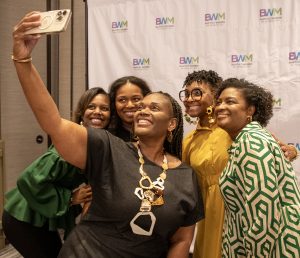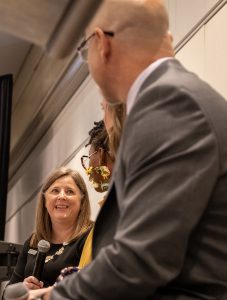Meredith Stone opened Baptist Women in Ministry’s 40th anniversary celebration dinner with spontaneous and scathing remarks about the Southern Baptist Convention’s continuing assault on female clergy.
“Forty years later and we are still talking about the SBC,” quipped Stone, BWIM’s executive director, during the June 29 dinner attended by 700 people in conjunction with the Cooperative Baptist Fellowship’s General Assembly in Atlanta.
“Why do men in power need to oppress women? There are several answers to that question, but my answer is that patriarchal identity is their reason for being, and they have to dominate others.”
Patriarchy and control are deeply imbedded in the denomination which was founded in the 19th century to support chattel slavery, she added. “They must continue that domination to remind themselves who they are.”
 Stone cited the March publication of a list of 170 SBC churches purported to have women serving as pastors in some capacity. The 218-page document was presented to support an amendment barring women from holding the title “pastor” in any SBC congregation. SBC messengers overwhelmingly approved the measure during the convention’s annual meeting in June.
Stone cited the March publication of a list of 170 SBC churches purported to have women serving as pastors in some capacity. The 218-page document was presented to support an amendment barring women from holding the title “pastor” in any SBC congregation. SBC messengers overwhelmingly approved the measure during the convention’s annual meeting in June.
She asked women who were on that list to stand. Women identified in a subsequent list, along with those who serve CBF congregations that are dually aligned with the SBC, also were invited to stand. The many who stood were applauded by BWIM’s 700 dinner guests.
Stone offered a blessing for the women and asked all those present to join her in declaring: “You are a Baptist pastor. You are valued by God, and you are valued by us. We see you, we believe in you, we are with you and may God empower you.”
She said her comments about the SBC were unplanned and she even questioned whether the denomination that is a former home to many in CBF was worth mentioning. She concluded it was.
“While the SBC might not be worth fighting for, women are. And there are millions of women who have been gaslighted to believe they are not as valuable as men are,” she said.
But there are many “hard fought, hard won” accomplishments to celebrate. More churches are professing support for women in ministry and more women are serving as pastors, Stone said.
“We are trying to knock over the dominoes of change.”
Yet it will take a lot more work to see BWIM’s vision realized, she continued. “We see a world in which women in ministry are wanted, not just tolerated … and where women thrive, not just survive. Our new vision is advocating for full inclusion of women in ministry.”
That goal is summed up in the organization’s new mission statement, Stone said: “BWIM supports women who pursue ministry and leadership with sustaining resources and community, and advocates for the full affirmation of women in ministry and leadership in Baptist life.”
The ministry’s new logo communicates its intention to widen connections throughout Baptist life, support women with resources and community, and to equip churches to affirm and value women in leadership. “We are trying to knock over the dominoes of change,” Stone said.

Meredith Stone, Kan’Dace Brock, Molly Shoulta Tucker, Jay Kieve
During the panel discussion portion of the program, Kan’Dace Brock praised the idea of providing community for women in ministry.
“I was always taught you need a village to do anything,” said Brock, lead pastor of The Message Church in San Antonio, Texas. “My sisters give me strength. I have to have that sisterhood.”
Molly Shoulta Tucker, pastor of Ridgewood Baptist Church in Louisville, Ky., shared an anecdote about her first Sunday on the job to illustrate the adjustments churches can make to welcome female leaders.

Chelsea Waite
She recalled being handed a lapel mic that day as she prepared for worship. But she wasn’t wearing a garment with lapels. “I looked down and said, ‘Wow, this isn’t going to work.’ The church for years had male pastors in blazers and lapel mikes. I’m their first woman pastor.”
It’s unfair that women have to shoulder these additional burdens in order to answer their callings to ministry, said Jay Kieve, director of ministerial transitions for CBF and its abuse response and prevention advocate.
 Even more egregious is that 81% of women have been sexually harassed and up to a third of women in ministry have been sexually harassed or assaulted on the job, Kieve said. “Women should not be required to be more resilient to overcome more harm in order to answer the call of God in their lives.”
Even more egregious is that 81% of women have been sexually harassed and up to a third of women in ministry have been sexually harassed or assaulted on the job, Kieve said. “Women should not be required to be more resilient to overcome more harm in order to answer the call of God in their lives.”
BWIM board Chair Rebecca Mathis concluded the gathering by announcing the organization’s new fundraising campaign aimed at generating $500,000 by the end of the year.
With $375,000 already raised, Mathis encouraged guests to use their smartphones to contribute to the effort. An additional $25,000 was generated in about 10 minutes.
Related articles:
Why I’m investing my inheritance in women in ministry | Opinion by Carol McEntyre
Women’s leadership in the church is a primary issue | Opinion by Hannah Coe
Those who say women cannot be pastors are ‘wrong,’ open letter asserts


